I Am Not a Serial Killer Read online
Page 3
“Three traits shared by ninety-five percent of serial killers,” said Dr. Neblin. “Bed-wetting, pyromania, and animal cruelty. You do, I admit, have all three.”
“I discovered that when I was eight,” I said. “What really got to me was not the fact that animal cruelty could predict violent behavior—it’s that up until I read about it, I never thought that it was wrong. I was killing animals and taking them apart, and I had all the emotional reaction of a kid playing with Legos. It’s like they weren’t real to me—they were just toys to play with. Things.”
“If you didn’t feel that it was wrong,” asked Dr. Neblin, “why did you stop?”
“Because that’s when I first realized that I was different from other people,” I said. “Here was something that I did all the time, and thought nothing of it, and it turns out the rest of the world thinks it’s completely reprehensible. That’s when I knew I needed to change, so I started making rules. The first one was; Don’t mess with animals.”
“Don’t kill them?”
“Don’t do anything to them,” I said. “I won’t have a pet, I won’t pet a dog on the street, and I don’t even like to go into a house where someone has an animal. I avoid any situation that might lead me back to doing something I know I shouldn’t do.”
Neblin looked at me for a moment. “Any others?” he asked.
“If I ever feel like hurting someone,” I said, “I give them a compliment. If someone’s really bugging me, until I hate them so much I start to imagine myself killing them, I say something nice and smile really big. It forces me to think nice thoughts instead of bad ones, and it usually makes them go away.”
Neblin thought for a moment before speaking. “That’s why you read so much about serial killers,” he said. “You don’t feel right and wrong the way other people do, so you read about it to find out what you’re supposed to avoid.”
I nodded. “And of course, it helps that they’re pretty cool to read about.”
He made some notes on his pad.
“So which rule did you break today?” he asked.
“I went to the place where they found Jeb Jolley’s body,” I said.
“I wondered why you hadn’t mentioned him yet,” he said. “Do you have a rule to stay away from violent crime scenes?”
“Not specifically,” I said. “That’s why I was able to justify it to myself. I wasn’t really breaking a specific rule, even if I was breaking the spirit of them.”
“And why did you go?”
“Because someone was killed there,” I said. “I . . . had to see it.”
“Were you a slave to your compulsion?” he asked.
“You’re not supposed to turn that around on me.”
“I kind of am,” said Neblin. “I’m a therapist.”
“I see dead bodies all the time in the mortuary,” I said, “and I think that that’s fine—Mom and Margaret have worked there for years, and they’re not serial killers. So I see lots of live people, and I see lots of dead people, but I’ve never actually seen a live person turn into a dead one. I’m . . . curious.”
“And the scene of a crime is the closest you can get without committing a crime yourself.”
“Yes,” I said.
“Listen, John,” said Neblin, leaning forward. “You have a lot of predictors for serial-killer behavior, I know—in fact, I think you have more predictors than I’ve ever seen in one person. But you have to remember that predictors are just that—they predict what might happen, they don’t prophesy what will happen. Ninety-five percent of serial killers wet their beds and light fires and hurt animals, but that doesn’t mean that ninety-five percent of kids who do those things will become serial killers. You are always in control of your own destiny, and you are always the one who makes your own choices—no one else. The fact that you have those rules, and that you follow them so carefully, says a lot about you and your character. You’re a good person, John.”
“I’m a good person,” I said, “because I know what good people are supposed to act like, and I copy them.”
“If you’re as thorough as you say you are,” said Neblin, “nobody will ever know the difference.”
“But if I’m not thorough enough,” I said, looking out the window, “who knows what could happen?”
3
Mom and I lived in a single-story apartment above the mortuary; our living room windows looked out over the front entrance, and our only door led down a set of enclosed steps to the side driveway. People always think it’s creepy to live over a mortuary, but it’s really just like any other house. Sure, we have dead bodies in the basement, but we also have a chapel, so it all balances out. Right?
By Saturday night we still didn’t have Jeb’s body. Mom and I ate dinner quietly, letting the shared pizza and the noise of the TV substitute for the companionship and conversation of a real relationship. The Simpsons was on, but I wasn’t really watching—I wanted that body. If the police kept it much longer, we wouldn’t be able to embalm it at all, just seal it in a bag and hold a closed-casket funeral.
Mom and I always disagreed on what kind of pizza to get, so we had the pizza place split it in half for us: my side had sausage and mushrooms, and her side had pepperoni. Even The Simpsons was a compromise—it came on after the news, and since changing the channel meant risking a fight, we just left it on.
During the first commercial break Mom put her hand on the remote, which usually meant she was going to mute the TV and talk about something, which usually meant we would get into an argument. She rested her finger on the mute button and waited, not pressing down. If she hesitated this long, whatever she wanted to talk about was probably pretty bad. After a moment she pulled back her hand, grabbed another piece of pizza, and took a bite.
We sat tensely through the next segment of the show, knowing what was coming and planning our moves. I thought about getting up and leaving, escaping before the next commercial break, but that would just antagonize her. I chewed slowly, watching numbly as Homer jumped and screamed and raced around on the screen.
Another commercial came on, and Mom’s hand hovered over the remote again—just briefly this time—before punching the mute button. She chewed, swallowed, and spoke.
“I talked to Dr. Neblin today,” she said.
I thought that might have something to do with this.
“He said that . . . well, he said some very interesting things, John.” She kept her eyes on the TV, and the wall, and the ceiling. Anywhere but me. “Do you have anything to say for yourself?”
“Thank you for sending me to a therapist, and I’m sorry that I actually need a therapist?”
“Don’t start snippy, John. We have a long way to go and I’d like to get through as much of it as we can before we get snippy.”
I took a deep breath, watching the TV. The Simpsons was back on, no less manic with the sound turned off. “What did he say?”
“He told me that you . . .” She looked at me. She was about forty years old, which she claimed was actually quite young, but on a night like this, arguing in the sickly light of the TV, her black hair pulled back, green eyes lined with worry, she looked beaten and weathered. “He told me that you think you’re going to kill somebody.” She shouldn’t have looked at me. She couldn’t say something like that and look at me at the same time without a flood of emotion rushing to the surface. I watched it redden her face and sour her eyes.
“That’s interesting,” I said, “since that’s not what I told him. Are you sure those were the words he used?”
“The words aren’t the issue here,” she said. “This isn’t a joke, John, this is serious stuff. The . . . I don’t know. Is this how it’s all going to end for us? You’re all I have left, John.”
“The actual words I used,” I said, “were that I followed strict rules to make sure I didn’t do anything wrong. It seems like you’d be pretty happy about that, but instead you’re yelling at me. This is why I need therapy.”
“
‘Happy’ is not a son who has to follow rules to keep himself from killing people,” she shot back. “ ‘Happy’ is not a psychologist telling me that my son is a sociopath. ‘Happy’ is—”
“He said I was a sociopath?” That was kind of cool. I’d always suspected, but it was nice to have an official diagnosis.
“Antisocial personality disorder,” she said, her voice rising. “I looked it up. It’s a psychosis.” She turned away. “My son’s a psychotic.”
“APD is primarily defined as a lack of empathy,” I said. I’d looked it up, too, a few months ago. Empathy is what allows people to interpret emotion, the same way ears interpret sound; without it you become emotionally deaf. “It means I don’t connect emotionally with other people. I wondered if he was going to pick that one.”
“How do you even know that?” she said. “You’re fifteen years old, for goodness’ sake, you should be . . . I don’t know, chasing girls or playing video games.”
“You’re telling a sociopath to chase girls?”
“I’m telling you not to be a sociopath,” she said. “Just because you mope around all the time doesn’t mean you’ve got a mental disorder—it means you’re a teenager, maybe, but not a psycho. The thing is, John, you can’t just have a doctor’s note to get you out of life. You live in the same world as the rest of us, and you’ve got to deal with it the same way the rest of us do.”
She was right, I could see a lot of benefit in being officially sociopathic. No more annoying group projects at school, for one thing.
“I think this is all my fault,” she said. “I dragged you into that mortuary when you were just a kid, and it messed you up for life. What was I thinking?”
“It’s not the mortuary,” I said. I bristled at the mention of it—she couldn’t take that away from me. “You and Margaret have worked there for how long? And you haven’t killed anybody yet.”
“We’re not psychotic, either.”
“Then you’re changing your story,” I said. “You just said the mortuary messed me up, and now you say it messed me up because I was already messed up? If you’re going to be like that, then I can’t win no matter what I do, can I?”
“There’s plenty you could do, John, and you know it. Stop writing homework assignments about serial killers, for one thing—Margaret told me you did it again.”
Margaret, you dirty snitch. “I got full points on that paper,” I said. “The teacher loved it.”
“Being really good at something you shouldn’t be doing doesn’t make it any better,” Mom said.
“It’s a history class,” I said, “and serial killers are a part of history. So are wars and racism and genocide. I guess I forgot to sign up for the ‘happy stuff only’ history class, sorry about that.”
“I just wish I knew why,” she said.
“Why what?”
“Why you’re so obsessed with serial killers.”
“Everybody’s got to have a hobby,” I said.
“John, don’t even joke about this.”
“Do you know who John Wayne Gacy is?” I asked.
“I do now,” she said, throwing up her hands, “thanks to Dr. Neblin. I wish to God I’d named you something different.”
“John Wayne Gacy was the first serial killer I ever learned about,” I said. “When I was eight years old, I saw my name in a magazine next to a picture of a clown.”
“I just asked you ten seconds ago to stop obsessing about serial killers,” she said. “Why are we talking about this?”
“Because you wanted to know why,” I said, “and I’m trying to tell you. I saw that picture and I thought maybe it was a clown movie with the actor John Wayne—Dad used to show me his cowboy movies all the time. It turns out John Wayne Gacy was a serial killer who dressed up as a clown for neighborhood parties.”
“I don’t understand where you’re going with this,” said Mom.
I didn’t know how to explain what I meant; sociopathy wasn’t just being emotionally deaf, it was being emotionally mute, too. I felt like the characters on our muted TV, waving their hands and screaming and never saying a word out loud. It was like Mom and I spoke completely different languages, and communication was impossible.
“Think about a cowboy movie,” I said, grasping at straws. “They’re all the same—a cowboy in a white hat rides around shooting cowboys with black hats. You know who’s good, you know who’s bad, and you know exactly what’s going to happen.”
“So?”
“So when a cowboy kills somebody you don’t even blink, because it happens every day. But when a clown kills somebody, that’s new—that’s something you’ve never seen before. Here’s someone you thought was good, and he’s doing something so terrible that normal human emotion can’t even deal with it—and then he turns around and does something good again. That’s fascinating, Mom. It’s not weird to be obsessed with that, it’s weird not to be.”
Mom stared at me for a moment.
“So serial killers are some kind of movie hero?” she said.
“That’s not what I’m saying at all,” I said. “They’re sick and twisted, and they do terrible things. I just don’t think it’s automatically sick and twisted to want to learn more about them.”
“There’s a big difference between wanting to learn about them and thinking you’re going to turn into one,” said Mom. “Now, I’m not blaming you—I’m not the best mother, and goodness knows your father was even worse. Dr. Neblin said you make rules for yourself, to keep you away from bad influences.”
“Yes,” I said. Finally she was starting to listen—to see the good things instead of the bad.
“I want to help,” she said, “so here’s a new rule: no more helping out in the mortuary.”
“What!”
“It’s not a good place for kids,” she said, “and I should never have let you help in the back room in the first place.”
“But I—” But what? What could I say that wouldn’t shock her even more? I need the mortuary because it connects me to death in a safe way? I need the mortuary because I need to see the bodies open up like flowers and talk to me and tell me what they know? She’d kick me out of the house altogether.
Before I could say anything else, Mom’s cell phone rang its tinny, electronic rendition of the William Tell overture that Mom had designated as the special ring tone for the coroner’s office—a call to duty. There was only one thing the coroner would be calling about at ten-thirty on a Saturday night, and we both knew it. She sighed and dug through her purse for the phone.
“Hi Ron,” she said. Pause. “No, that’s okay, we were just finishing up anyway.” Pause. “Yes, we know. We’ve been expecting it.” Pause. “I’ll be down in a minute, so whenever you can come by is fine. Seriously, don’t worry about it—we both knew the hours when we signed up.” Pause. “You, too, I’ll talk to you later.”
She hung up the phone with a sigh. “I suppose you know what that was about,” she said.
“The police are done with Jeb’s remains.”
“They’re delivering him in fifteen minutes,” she said. “I need to get downstairs. I . . . we need to finish this discussion later. I’m sorry, John, about everything. This could have been a nice family dinner.”
I glanced back at the TV. Homer was strangling Bart.
“I want to help you,” I said. “It’s after ten—you’ll be up all night if you try to do it alone.”
“Margaret will help,” she said.
“So it will take you five hours instead of eight—it’s still too long. If I help we can be done in three.” I kept my voice calm and even; I couldn’t let her take it all away, but I didn’t dare let her know how important it was.
“The body is in very poor condition, John. He was torn apart. It’s going to take a long time to put him back together, and it’s going to be very disturbing, and you’re a clinical psychopath.”
“Ouch, Mom.”
She gathered up her purse. “Either it bothers you,
in which case you shouldn’t go, or it doesn’t bother you, in which case you should have stopped going a long time ago.”
“Do you really want to leave me here alone?”
“You’ll find something constructive to do,” she said.
“We’re going to go put a body together,” I said, “what’s more constructive than that?” I winced immediately—dark humor wouldn’t help my case at all. It had been a reflex, cutting the tension with a joke the way Dr. Neblin did.
“And I don’t like the way you joke about death,” she said. “Morticians are surrounded by death—we breath it every minute of every day. That much contact can make you lose your reverence for it. I’ve seen it in myself, and it bothers me. If death weren’t so familiar to you, you might be a little better off.”
“I’m fine, Mom,” I said. What could I do to convince her? “You know you need the help, and you know you don’t want to leave me alone.” Even if I didn’t have any empathy, Mom did, and that meant I could use it against her. Where logic failed, guilt might save the day.
She sighed and closed her eyes, squeezing them shut against some mental image I could only guess at. “Fine. But let’s finish the pizza first.”
My sister Lauren left home six years ago, two years after Dad did. She was only seventeen at the time, and goodness knows what she’d gotten into while she was gone. The house had a lot less screaming now, which was nice, but what screaming remained was usually focused on me. About six months ago, Lauren came back to Clayton, hitchhiking in from who knows where, and contritely asked my mom for a job. They still barely spoke to each other, and she never visited us or invited us to visit her apartment, but she worked as the mortuary receptionist and got along well enough with Margaret.
We all got along well enough with Margaret. She was the rubber insulation that kept our family from sparking and shorting out.
Mom called Margaret while we finished our pizza, and apparently Margaret called Lauren because they were both there when we finally went downstairs to the mortuary—Margaret in her sweats and Lauren tarted up for a Saturday night on the town. I wondered if we’d interrupted anything in particular.

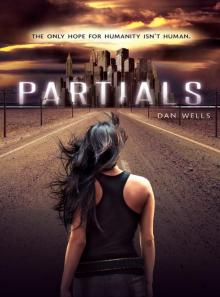 Partials
Partials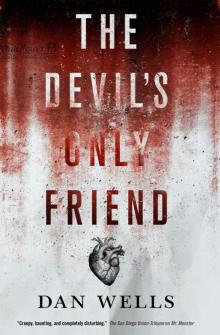 The Devil's Only Friend
The Devil's Only Friend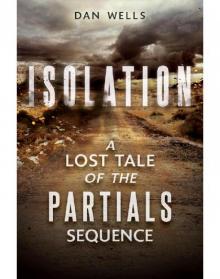 Isolation
Isolation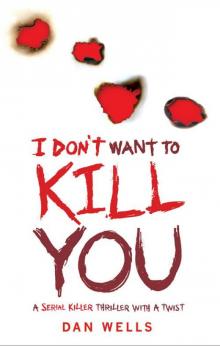 I Don't Want to Kill You
I Don't Want to Kill You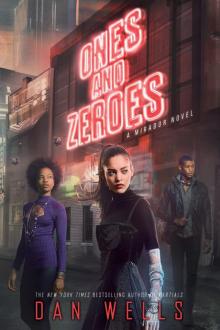 Ones and Zeroes
Ones and Zeroes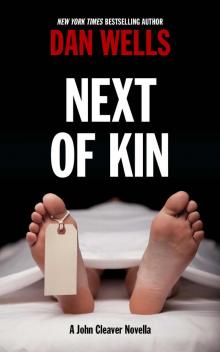 Next of Kin
Next of Kin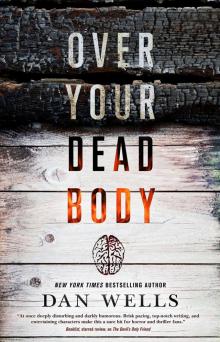 Over Your Dead Body
Over Your Dead Body Fragments
Fragments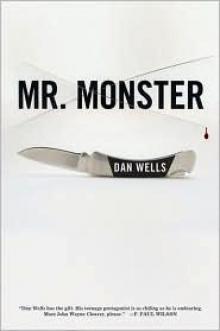 Mr. Monster
Mr. Monster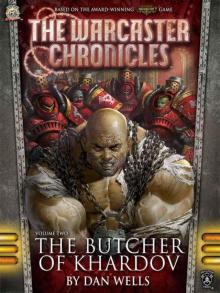 The Butcher of Khardov
The Butcher of Khardov I AM NO T A S E RI AL KI L L E R
I AM NO T A S E RI AL KI L L E R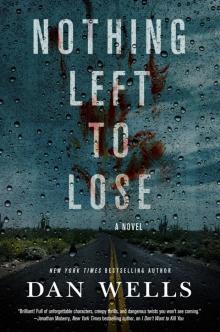 Nothing Left to Lose--A Novel
Nothing Left to Lose--A Novel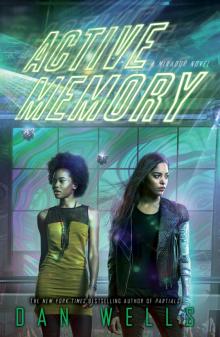 Active Memory
Active Memory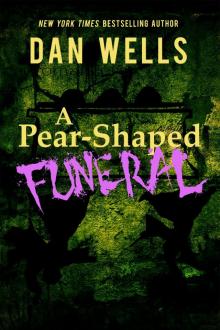 A Pear-Shaped Funeral
A Pear-Shaped Funeral I Am Not a Serial Killer
I Am Not a Serial Killer Bluescreen
Bluescreen Ruins
Ruins Zero G
Zero G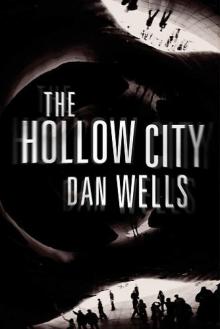 The Hollow City
The Hollow City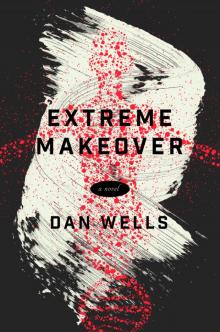 Extreme Makeover
Extreme Makeover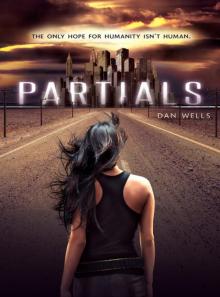 Partials p-1
Partials p-1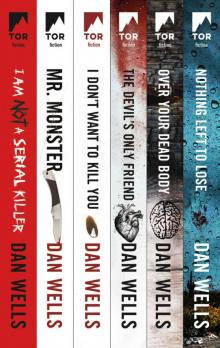 The Complete John Wayne Cleaver Series: I Am Not a Serial Killer, Mr. Monster, I Don't Want to Kill You, Devil's Only Friend, Over Your Dead Body, Nothing Left to Lose
The Complete John Wayne Cleaver Series: I Am Not a Serial Killer, Mr. Monster, I Don't Want to Kill You, Devil's Only Friend, Over Your Dead Body, Nothing Left to Lose